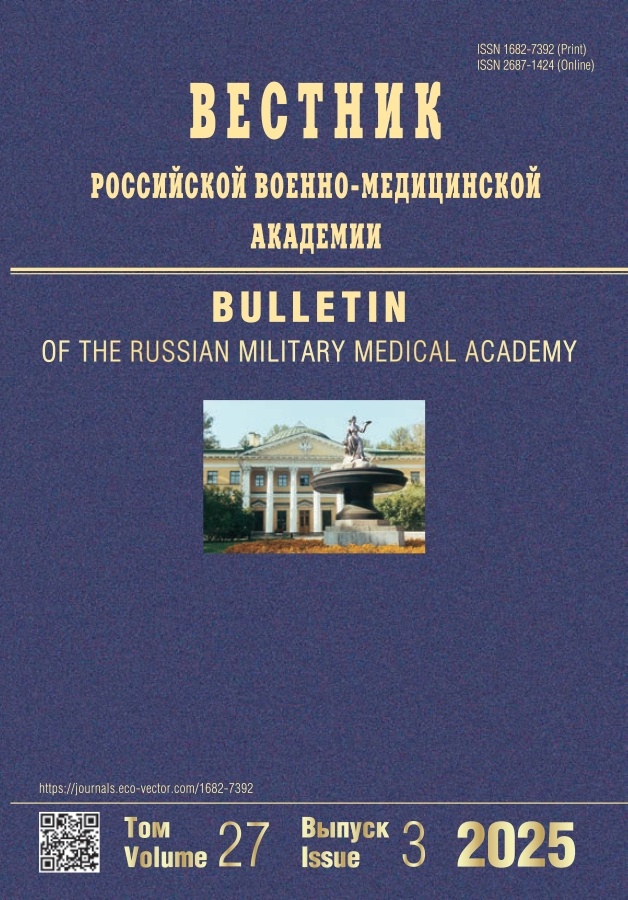Immune dysfunction in millitary personnel participating in special tasks and the possibility of medical and psychological rehabilitation
- 作者: Zaitseva N.S.1, Bagmet A.D.1, Tsygan V.N.2
-
隶属关系:
- Rostov State Medical University
- Military Medical Academy of S.M. Kirov
- 期: 卷 24, 编号 2 (2022)
- 页面: 307-314
- 栏目: Original Study Article
- URL: https://journals.rcsi.science/1682-7392/article/view/105725
- DOI: https://doi.org/10.17816/brmma105725
- ID: 105725
如何引用文章
详细
The article considers immune dysfunction in military personnel participating in special operations and the possibilities of their medical and psychological rehabilitation. The state of the immune status of 73 servicemen (average age 37.6 ± 4.1 years) who participated in special operations in areas with a difficult operational situation and underwent a 20-day standard course of medical and psychological rehabilitation in the sanatoriums of the sanatorium complexes “North Caucasian”, “Sochi”, and “Crimean” was monitored. Immune status was assessed before and after participation in special operations and after a course of medical and psychological rehabilitation. Immune dysfunction due to quantitative and functional changes in the immune status was established. Soldiers participating in special operations registered a decrease in the synthesis and differentiation of T-lymphocytes, inhibition of the functionality of cytotoxic lymphocytes, reduced cytolytic potential of natural killer cells, impaired antigen-presenting function of monocytes, and a significant decrease in the number of B lymphocytes with preserved antibody-producing function. The rehabilitation course for military personnel participating in special operations led to the normalization of the analyzed parameters, except for the functional activity of natural killer cells and monocytes. Given the lack of full recovery of homeostatic reserves in the immune system, a more in-depth study of the problem and development of a personalized approach to rehabilitation of the military participants with the assessment of immunological markers are necessary.
作者简介
Natalia Zaitseva
Rostov State Medical University
编辑信件的主要联系方式.
Email: n.zaitseva@list.ru
ORCID iD: 0000-0003-4170-1180
SPIN 代码: 4232-0084
Scopus 作者 ID: 9040438100
Candidate of Medical Sciences
俄罗斯联邦, Rostov-on-DonAlexander Bagmet
Rostov State Medical University
Email: bagmet1957@yandex.ru
SPIN 代码: 1082-7380
Doctor of Medical Sciences, Professor
俄罗斯联邦, Rostov-on-DonVasily Tsygan
Military Medical Academy of S.M. Kirov
Email: vn-t@mail.ru
ORCID iD: 0000-0003-1199-0911
SPIN 代码: 7215-6206
Scopus 作者 ID: 6603136317
Doctor of Medical Sciences, Professor
俄罗斯联邦, Saint Petersburg参考
- Karayani AG, Utlik EP. Self-regulation of functional states by the soldiers in combat. Psychopedagogics in law enforcement. 2018;(3):5–9. (In Russ.). doi: 10.24411/1999-6241-2018-13001
- Tokarev AR. Neuro-cytokine mechanisms of acute stress (literature review). Journal of new medical technologies. 2019;(3):194–204. (In Russ.). doi: 10.24411/2075-4094-2019-16469
- Kupriyanov RV, Zhdanov RI. Stress i allostaz: problemy, perspektivy i vzaimosvyaz'. Zhurnal vysshei nervnoi deyatelnosti imeni IP Pavlova. 2014;64(1):21–31. (In Russ.). doi: 10.7868/S0044467714010080
- Potemina TE, Zuykova AA, Kuznetsova SV, Pereshein AV. Maladaptive changes in the nervous system after combat stress and injuries. Bulletin of the Medical Institute "REAVIZ" (rehabilitation, doctor and health). 2019;(4):73–77. (In Russ.).
- Rybakina EG, Shanin SN, Fomicheva EE, et al. Cell-molecular mechanisms of protective function’s changes under traumatic brain injury and ways for it’s medication. Medical academic journal. 2014;14(4):55–62. (In Russ.). doi: 10.17816/MAJ14455-62
- Zaitseva NS, Sizyakina LP. The immune dysfunction in the structure of comorbid diseases in the combatants in the late period of observation. Immunologiya. 2016;37(5):267–270. (In Russ.). doi: 10.18821/0206-4952-2016-37-5-267-270
- Cañas-González B, Fernández-Nistal A, Ramírez JM, Martínez-Fernández V. Influence of stress and depression on the immune system in patients evaluated in an anti-aging unit. Front Psychol. 2020;11(4):1844. doi: 10.3389/fpsyg.2020.01844
- Nagornova AYu, Azarnykh TD, Kayasheva OI, et al. Stress i ehmotsional'noe vygoranie: metody profilaktiki. Ulyanovsk: Zebra, 2019. 79 p. (In Russ.).
- Apchel VYa, Tsygan VN. Stress i stressoustoichivost' cheloveka. Saint Petersburg: RMMA, 1999. 86 p. (In Russ.).
- Mancini G, Garbonasa A, Heremans J. Immunochemical quantitation of antigens by simple radial immunodiffusion. Immunochemistry. 1965;2(3):235–264. doi: 10.1016/0019-2791(65)90004-2
- Koubassov RV, Barachevsky YuE, Sibileva EN, et al. Influence of extreme factors of military service on adaptive capacity and health of members of law enforcement agencies of Russia. Bulletin of the Russian Military Medical Academy. 2015;(2):217–223. (In Russ.).
- Bagmet AD, Zaitseva NS, Ramazanov AU. Mechanisms of comorbid pathology progression among military veterans of modern wars. Russian journal of occupational health and industrial ecology. 2017;(9):14–15. (In Russ.).
补充文件








